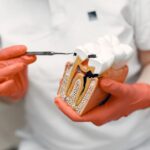Root canals can save teeth, but most people would prefer to avoid needing one altogether. The good news is that with the right preventive care and habits, you can reduce your risk of developing severe tooth decay or infection that would require a root canal. Here are practical steps to help you keep your teeth healthy and avoid a root canal.
1. Prioritize Regular Dental Checkups
Routine dental visits are essential for detecting issues before they become serious. At Gamboa Dental Group in Miami, regular cleanings and exams help catch decay or early signs of infection, giving your dentist a chance to address these issues promptly and prevent the need for a root canal.
2. Practice Excellent Oral Hygiene
Good oral hygiene is the first line of defense against tooth decay. Brushing twice daily, flossing once daily, and using an antibacterial mouthwash can help keep bacteria at bay and prevent decay. Be thorough and gentle, focusing on removing plaque without damaging gums or enamel.
3. Avoid Sugary and Acidic Foods
Excessive sugar and acid erode enamel, leading to cavities and eventually deeper decay that may require a root canal. Limit sugary drinks and snacks, and opt for water, fresh fruits, and other tooth-friendly options. If you consume something sugary or acidic, rinse your mouth afterward to minimise damage.
4. Address Cavities Early
Small cavities are easy to fix with a simple filling, but if left untreated, they can worsen and infect the pulp, making a root canal necessary. Regular checkups help spot cavities early, and Gamboa Dental Group can provide fast treatment to keep your teeth healthy.
5. Use Fluoride Products
Fluoride helps strengthen enamel and prevents decay. Use fluoride toothpaste and mouthwash to boost your enamel’s resistance to bacteria. Ask your dentist about professional fluoride treatments, which can add an extra layer of protection, especially if you’re prone to cavities.
6. Wear a Mouthguard if You Grind Your Teeth
Grinding your teeth (bruxism) can cause cracks and wear that make teeth vulnerable to decay and infection. Wearing a custom mouthguard at night can help protect your teeth, reducing your risk of needing restorative treatments like a root canal.
7. Don’t Ignore Tooth Pain or Sensitivity
Tooth pain or sensitivity can be early signs of decay or infection. Ignoring these symptoms can lead to severe decay and increase the likelihood of needing a root canal. If you notice pain or prolonged sensitivity, consult your dentist at Gamboa Dental Group as soon as possible.
FAQs About Avoiding Root Canals
1. What are the early signs that I might need a root canal?
Persistent tooth pain, sensitivity to hot or cold, and darkening of the tooth can indicate a potential need for a root canal.
2. Can I prevent a root canal if I already have a cavity?
If the cavity is treated early, you can avoid further decay that might require a root canal. Timely fillings can prevent the issue from worsening.
3. How does fluoride help in avoiding a root canal?
Fluoride strengthens tooth enamel, making it harder for bacteria to penetrate and cause decay that could lead to a root canal.
4. Is avoiding sugary foods enough to prevent a root canal?
While reducing sugar intake helps, maintaining good oral hygiene and regular dental visits are also essential in preventing decay and infection.
5. Can a cracked tooth lead to a root canal?
Yes, cracks allow bacteria to enter the tooth, leading to infection. Using a mouthguard and addressing cracks early can help prevent this.
6. How often should I visit the dentist to avoid a root canal?
Routine checkups every six months are recommended, but more frequent visits may be necessary if you have high risk for cavities.
7. Does a mouthguard really help prevent root canals?
Yes, a mouthguard protects against grinding-related damage that can lead to decay and infection, lowering the risk of needing a root canal.
Preventive care and regular checkups at Gamboa Dental Group in Miami are key to maintaining strong, healthy teeth and avoiding root canals. By following these tips, you can protect your smile and reduce the need for extensive dental treatments.





